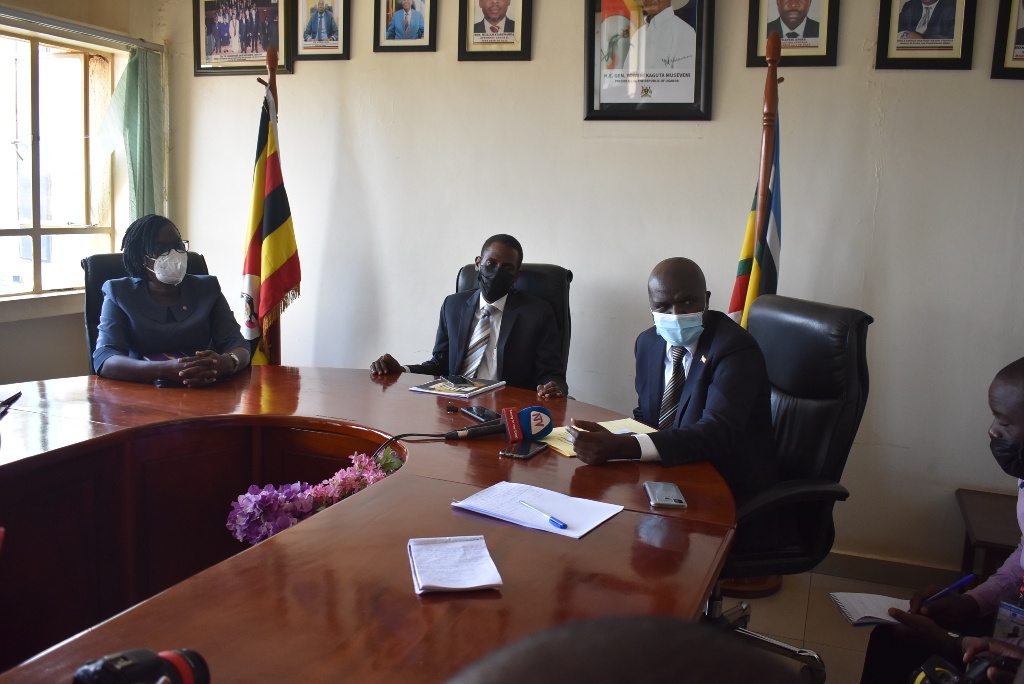
The Uganda Human Rights Commission (UHRC) visited the new Attorney General (AG) of Uganda Hon. Kiryoowa Kiwanuka, on Tuesday July 27, 2021 to streamline coordination and ensure better working relations between the two institutions. The visit which was initiated by the Attorney General himself saw the Commission present to him a number of issues affecting its operations.
“I called this meeting as way of familiarizing myself with institutions, agencies and bodies which my office works with. It is a meet and greet engagement to have an off-the-cuff conversation on the challenges your institution is facing and what you want the AG to address among other things,” Hon. Kiwanuka said in his introductory remarks at the meeting. He said his office intends to apply a more open-door policy to the extent of even tolerating telephone calls from agencies that will be following up on their issues.
In his brief on behalf of the Chairperson of the Commission, Commissioner Meddie B Mulumba highlighted a number of challenges; key among which is funding. “Among the recommendations made to Uganda during the 2016 Universal Periodic Review (UPR) process, was for it to adequately fund its National Human Rights Institution, which is the UHRC. Whereas government accepted this recommendation and made it one of its voluntary pledges, it has not been implemented to date. This state of affairs continues to obtain even in spite of the numerous assertions by the President of the need for government to fund the Commission in order to progressively wean it off donor funding. In addition, Parliament through its Committee on Legal and Parliamentary Affairs has every financial year also made recommendations for adequate funding for the Commission. However, these recommendations have also not been implemented to date,” he stated.
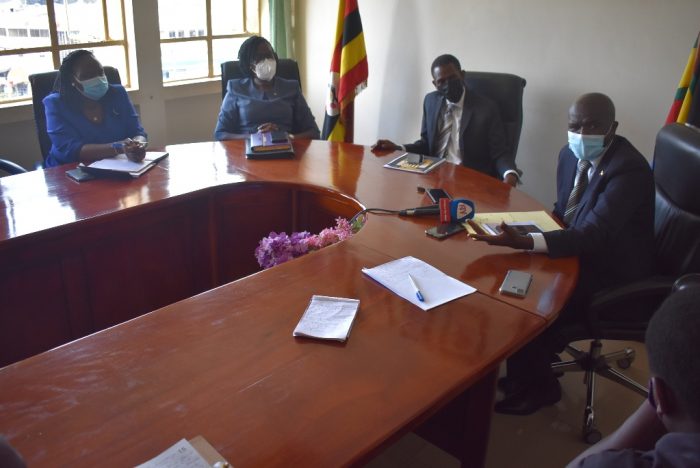
L-R_ UHRC Director Ruth Sekindi, Commissioner Dr. Patricia Achan, AG Kiryoowa Kiwanuka and Commissioner Meddie Mulumba jointly addressing the media on Tuesday 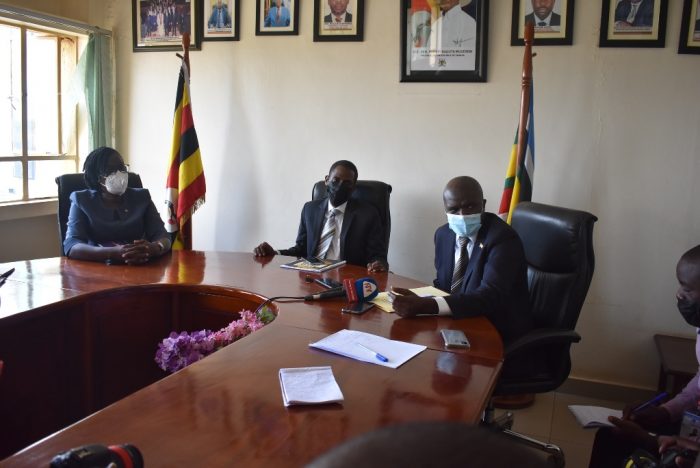
Members of the Commission_ Hon. Mulumba and Dr. Achan joint the Attorney General Hon. Kiryoowa Kiwanuka to jointly brief the media about the Tuesday meeting 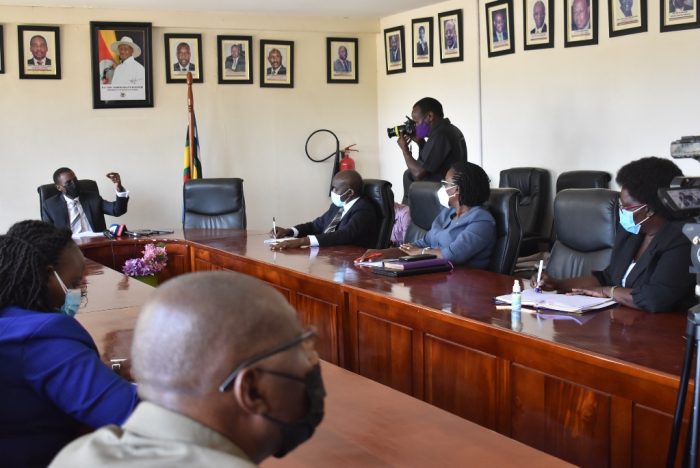
The AG Mr. Kiryoowa Kiwanuka (R) addressing Members of the Commssion and Directors. 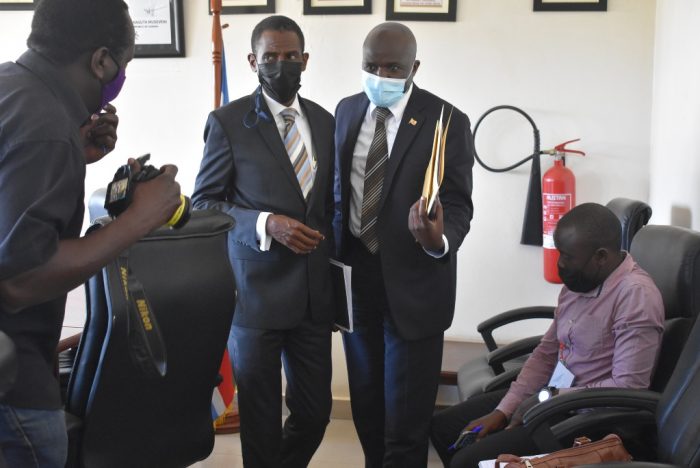
The Attorney General Hon. Kiryoowa Kiwanuka leaves the boardroom with Commission Meddie Mulumba, Chairperson of the Commission 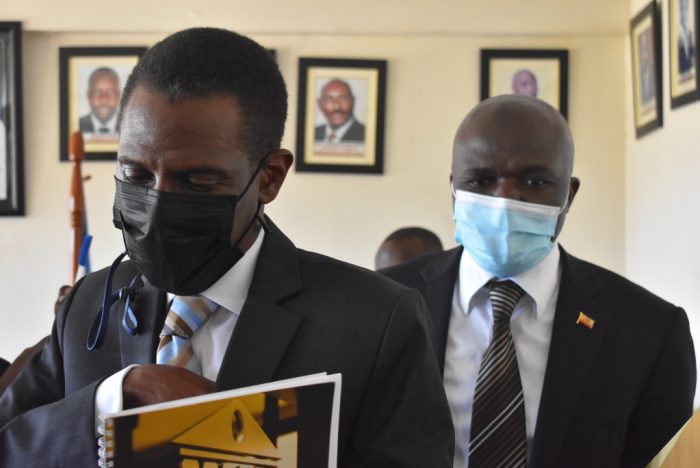
The Attorney General Hon. Kiryoowa Kiwanuka leaves the boardroom with Commissioner Meddie Mulumba, Chairperson of the Commission
He further revealed the current state of Commission funding which he said has left it with support from Government and the Justice Law and Order Sector (JLOS) as the only funders. This he said follows expiry of the Commission’s funding agreements with its development partners. He in this regard specifically referred to the funding agreement with the Democratic Governance Facility (DGF), which is the Commission’s main donor, which had ended in the financial year 2020/2021. Commissioner Mulumba informed the Attorney General that the current state of affairs has therefore left the Commission with an additional funding deficit of Shs2.7bn. He consequently appealed to the Attorney General to add his voice to that of the Legal and Parliamentary Affairs Committee of Parliament to cause the Ministry of Finance, Planning and Economic Development to fully fund the Commission. He noted that this move would be in line with guidelines under the Paris Principles that govern National Human Rights Institutions (NHRIs).
Still in his brief to the Attorney General, Commissioner Mulumba also called on the Ministry of Justice and Constitutional Affairs to streamline the process of decentralization of payment of Tribunal awards by the MDAs. He appealed to the Ministry of Justice to act as a focal point to coordinate this new compensation awards process by ensuring close follow up with the concerned MDAs to attain timely compensation to the victims of human rights violations. The other pressing challenges that were highlighted in the brief to the AG included the need to enhance salaries of staff to make them competitive in order to curb the current high labour turnover at the Commission and the need for government to avail funds to construct the UHRC Headquarters on its Buganda Road land.
However, the funding gaps notwithstanding, Mr. Mulumba said the Commission had registered a number of achievements. These among others include, the Commission being voted the best National Human Rights Institution (NHRI) in Africa, a position it has held since 2012 to date. He said this high rating was in recognition of the performance and efforts of UHRC in the protection and promotion of human rights in Uganda. “The Commission is also an “A” status National Human Rights Institution, a ranking it has retained over the years in all the four accreditation processes. The Commission was first accredited with “A” status in 2001 by the then International Coordinating Committee (ICC); currently the Global Alliance for National Human Rights Institution (GANHRI) and has since remained an “A” status institution to date after being accredited on various occasions in April 2001, April 2008, May 2013 and May 2018,” he stated.
Other achievements of the Commission which Mr. Mulumba highlighted are the successful integration of Human Rights in the national planning processes. He pointed out the continuous efforts by the Commission and the National Planning Authority (NPA) to mainstream the Human Rights Based Approach (HRBA) in the National Development Plans (II and III), Sector Development Plans and Local Government Development Plans. Other achievements of the Commission that he highlighted at the meeting with the new AG include fulfillment of its constitutional mandate by submitting 21 Annual Reports to date on the state of human rights in the country to the Parliament of Uganda; continuous review of bills before parliament and bylaws by local governments for human rights compliance; and issue of human rights advisories to government on emerging human rights issues on their human rights implications. He noted that the Commission has also over the years made great strides in training security agencies, particularly, Police, UPDF, Prisons, CMI and ISO on principles of human rights and their constitutional obligations to protect human rights. He further pointed out the Commission’s achievements with regard to infrastructure, which include owning land at Buganda Road and cconstruction of own premises for its Gulu Regional Office.
To supplement the formal brief of the Commission, Dr. Patricia Achan-Okiria, one of the Members of the Commission present at the meeting informed the AG of the steps being undertaken so far by the Commission in readiness of its imminent merger with the Equal Opportunities Commission. She revealed that the Commission had commenced working on modalities of creating a special directorate for Equal Opportunities, in-line with the government’s programme to merge some Agencies. She however requested for support from the office of the AG in this endeavour. She also appealed to the office of the Attorney General to continue playing its crucial role in ensuring that Government ratifies all the pending international conventions without further delay to strengthen the state of human rights in Uganda.
The other officials on the Commission team present at the meeting were; the Acting Secretary to the Commission Ms. Margaret Ejang; Ms. Ida Nakiganda, the Director of Complaints, Investigations and Legal Services (CILS); Ms. Ruth Sekindi the Director of Monitoring and Inspections (M&I; Mr. Kamadi Byonabye the Director of Research, Education and Documentation (RED), also doubling as caretaker of the Directorate of Regional Services; and Mr. Christopher Turigye, the Acting Director of Finance and Administration (FAD). While the team from the Attorney General’s Office included Mr. John Bosco Ssuuza, the Director Civil Litigation and two other officers.
Raising some of the critical issues under their respective dockets at the Commission, the Secretary to the Commission Ms. Ejanga pointed out how the absence of a fully constituted Commission due to delayed appointment of a Chairperson and Commissioners has hampered the Commission’s operations and service delivery. She cited the case of delayed appointment of Members of the Commission on expiry of contracts for the serving Members which has now regrettably become a regular occurrence. She appealed for the AG’s early intervention in the appointment of Commissioners for the coming term of office to avoid similar situations in future. On her part, Ms. Nakiganda implored the AG to appoint a focal person to receive and follow-up the Commission tribunal rulings and to fast track the process of tribunal hearings as well as its compensation awards. Speaking to the Commission’s function of monitoring government compliance with international human rights standards, Ms. Ssekindi reminded the AG of the pending government commitment to develop and implement a National Action Plan (NAP) on Human Rights, made years back during the last Universal Periodic Review. She appealed to the AG to use his good office to ensure that the National Action Plan on Human Rights is in place at least before the next review process which is due in January 2022.
Responding to issues raised by the Commission, the AG said he had appointed Mr. John Bosco Ssuuza, the Director Civil Litigation, as the focal point person on matters to do with UHRC tribunals. He also offered to personally oversee the UHRC tribunal processes. He went on to inform the Commission that he will also personally ensure that State Attorneys play their role during tribunal hearings in an effective manner, so as to enhance access to justice and service delivery by the tribunals.
On the delayed appointment of the UHRC Chairperson and Commissioners, Hon. Kiryoowa Kiwanuka noted that while it was important for the Commission to communicate the expiry of such contracts to government well in advance, he hailed its current innovation of rotating the position of Acting Chairperson among Commissioners, which has for now addressed the gap of leadership in the institution. He allayed the fears of the Commission on Uganda’s implementation of Universal Peer Review recommendations by pledging to immediately submit the already drafted National Action Plan on Human Rights (NAP) to cabinet for approval.
During the meeting, the Attorney General revealed his passion for Human Rights as the reason for meeting the UHRC team first, ahead of all the other institutions under the sector. He urged the Commission to do more in the area of human rights education because Human Rights is about common behavior and attitude. “I think we have moved as a country in terms of human rights. All we need now as Government is to empower the Commission to go out there and talk to people. If we talk enough, the violations will reduce and our need to investigate and pay compensation to victims will also reduce,” he said. He therefore, called on the UHRC to appreciate the critical need to prioritise programmes such as civic education, which are aimed at preventing human rights violations.
.
The Uganda Human Rights Commission (UHRC) visited the new Attorney General (AG) of Uganda Hon. Kiryoowa Kiwanuka, on Tuesday July 27, 2021 to streamline coordination and ensure better working relations between the two institutions. The visit which was initiated by the Attorney General himself saw the Commission present to him a number of issues affecting its operations.
“I called this meeting as way of familiarizing myself with institutions, agencies and bodies which my office works with. It is a meet and greet engagement to have an off-the-cuff conversation on the challenges your institution is facing and what you want the AG to address among other things,” Hon. Kiwanuka said in his introductory remarks at the meeting. He said his office intends to apply a more open-door policy which will even tolerate telephone calls from agencies in following up on their issues.
In his brief on behalf of the Chairperson of the Commission, Commissioner Meddie B Mulumba highlighted a number of challenges; key among which is funding. “Among the recommendations made to Uganda during the 2016 Universal Periodic Review (UPR) process, was for it to adequately fund its National Human Rights Institution, which is the UHRC. Whereas government accepted this recommendation and made it one of its voluntary pledges, it has not been implemented to date. This state of affairs continues to obtain even in spite of the numerous assertions by the President of the need for government to fund the Commission in order to progressively wean it off donor funding. In addition, Parliament through its Committee on Legal and Parliamentary Affairs has every financial year also made recommendations for adequate funding for the Commission. However, these recommendations have also not been implemented to date,” he stated.
He further revealed the current state of Commission funding which he said has left it with support from Government and the Justice Law and Order Sector (JLOS) as the only funders. This he said follows expiry of the Commission’s funding agreements with its development partners. He in this regard referred to the funding agreement with the Democratic Governance Facility (DGF), which is the Commission’s main donor that had ended in the financial year 2020/2021. Commissioner Mulumba informed the Attorney General that the current state of affairs has therefore left the Commission with an additional funding deficit of Shs2.7bn. The Commissioner consequently appealed to the Attorney General to add his voice to that of the Legal and Parliamentary Affairs Committee of Parliament to cause the Ministry of Finance, Planning and Economic Development to fully fund the Commission. He noted that this move would be in line with guidelines under the Paris Principles that govern National Human Rights Institutions (NHRIs).
Still in his brief to the Attorney General, Commissioner Mulumba also called on the Ministry of Justice and Constitutional Affairs to streamline the process of decentralization of payment of Tribunal awards by the MDAs. He appealed to the Ministry of Justice to act as a focal point to coordinate this new compensation awards process by ensuring close follow up with the concerned MDAs to attain timely compensation to the victims of human rights violations. The other pressing challenges that were highlighted in the brief to the AG included the need to enhance salaries of staff to make them competitive in order to curb the current high labour turnover at the Commission and the need for government to avail funds to construct the UHRC Headquarters at its Buganda Road premises.
However, the funding gaps notwithstanding, Mr. Mulumba said the Commission had registered a number of achievements. These among others include, the Commission being voted the best National Human Rights Institution (NHRI) in Africa, a position it holds since 2012 to date. This was in recognition of the performance and efforts of UHRC in the protection and promotion of human rights in Uganda. “The Commission is also an “A” status National Human Rights Institution, a ranking it has retained over the years in all the four accreditation processes. The Commission was first accredited with “A” status in 2001 by the then International Coordinating Committee (ICC); currently the Global Alliance for National Human Rights Institution (GANHRI) and has since remained an “A” status institution to date after being accredited in April 2001, April 2008, May 2013 and May 2018,” he stated.
Other achievements of the Commission which were highlighted are the successful integration of Human Rights in the national planning processes. He pointed out the continuous efforts by the Commission and the National Planning Authority (NPA) to mainstream the Human Rights Based Approach (HRBA) in the National Development Plans (II and III), Sector Development Plans and Local Government Development Plans. Other achievements of the Commission that were heighted by Commissioner Mulumba during the meeting include fulfillment of its constitutional mandate by submitting 21 Annual Reports on the state of human rights in the country to the Parliament of Uganda, to date. The Commission has also continued to review bills, advise parliament and government through advisories and local governments on various bills and bylaws in regard to their human rights implications. The Commission also has over the years made great strides in training security agencies, particularly, Police, UPDF, Prisons, CMI and ISO on principles of human rights and their constitutional obligations to protect human rights. He also pointed out the Commission’s achievements with regard to infrastructure, which included owning land at Buganda Road and cconstruction of own premises for its Gulu Regional Office.
To supplement the formal brief of the Commission, Dr. Patricia Achan-Okiria, one of the Members of the Commission present at the meeting informed the AG of the steps being undertaken by the Commission so far in readiness for imminent merger with the Equal Opportunities Commission. She revealed that the Commission had commenced working on modalities of creating a special directorate for Equal Opportunities, in-line with the government’s programme to merge some Agencies. She however requested for support from the office of the AG in this endeavour. She also appealed to the office of the Attorney General to continue playing its crucial role in ensuring that Government ratifies all the pending international conventions without further delay.
The other officials on the Commission team present were; the Acting Secretary to the Commission Ms. Margaret Ejang; Ms. Ida Nakiganda, the Director of Complaints, Investigations and Legal Services (CILS); Ms. Ruth Sekindi the Director of Monitoring and Inspections (M&I; Mr. Kamadi Byonabye the Director of Research, Education and Documentation (RED), also doubling as caretaker of the Directorate of Regional Services; and Mr. Christopher Turigye, the Acting Director of Finance and Administration (FAD). The team present from the Attorney General’s Office were Mr. John Bosco Ssuuza, the Director Civil Litigation and other two officers.
Raising some of the critical issues under their respective mandates at the Commission, the Secretary to the Commission Ms. Ejanga noted how the absence of a fully constituted Commission due to delayed appointment of a Chairperson and Commissioners has hampered its operations and service delivery. She cited the case of delayed appointment of Members of the Commission on expiry of contracts for the serving Members which has now regrettably become a regular occurrence. She appealed for the AG’s early intervention in the appointment of Commissioners to avoid similar situations in future. On her part, Ms. Nakiganda implored the AG to appoint a focal person to receive and follow-up the Commission tribunal rulings and to fast track the process of tribunal hearings as well as its compensation awards. Speaking to the Commission’s mandate to monitor government compliance with human rights standards, Ms. Ssekindi reminded the AG of the pending government commitment to develop and implement a National Action Plan (NAP) on Human Rights, made years back during the previous Universal Periodic Review. She appealed to the AG to use his good office to ensure that the National Action Plan on Human Rights is in place at least before the next review process which is due in January 2022.
Responding to issues raised by the Commission, the AG said he had appointed Mr. John Bosco Ssuuza, the Director Civil Litigation assisted by two other officers to act focal point persons on matters to do with UHRC tribunals. He also offered to personally oversee the UHRC tribunal processes. He went on to inform the Commission that he will personally ensure that State Attorneys play an effective role during tribunal hearings so as to enhance access to justice and service delivery by these tribunals.
On the delayed appointment of the UHRC Chairperson and Commissioners, Hon. Kiryoowa Kiwanuka noted that while it was important for the Commission to communicate the expiry of such contracts to government well in advance, he hailed the current innovation of rotating the position of Acting Chairperson among Commissioners, which has for now addressed the gap of leadership in the institution. He allayed the fears of the Commission by pledging to submit the already drafted National Action Plan on Human Rights (NAP) to cabinet for approval.
The Attorney General emphasized his passion for Human Rights and revealed that it is the reason for meeting the UHRC first, ahead of all the other institutions under the sector. He urged the Commission to do more in the area of human rights education because Human Rights is about common behavior.
“I think we have moved as a country in terms of human rights. All we need now as Government is to empower the Commission to go out there and talk to people. If we talk enough, the violations will reduce and our need to investigate and pay compensation to victims will also reduce,” he said.
He therefore, urged the UHRC to appreciate the critical need to prioritise programmes aimed at preventing human rights violations.
